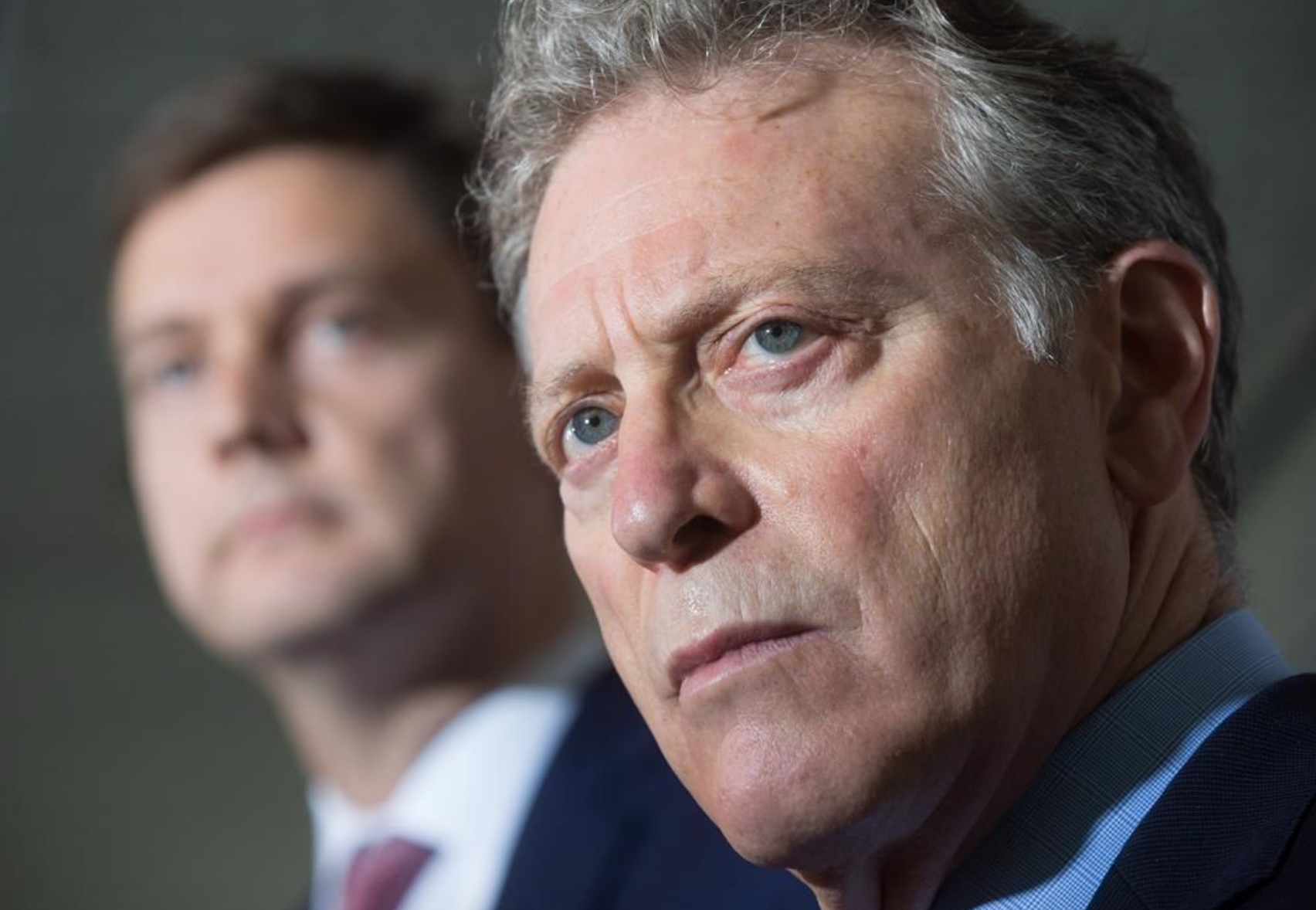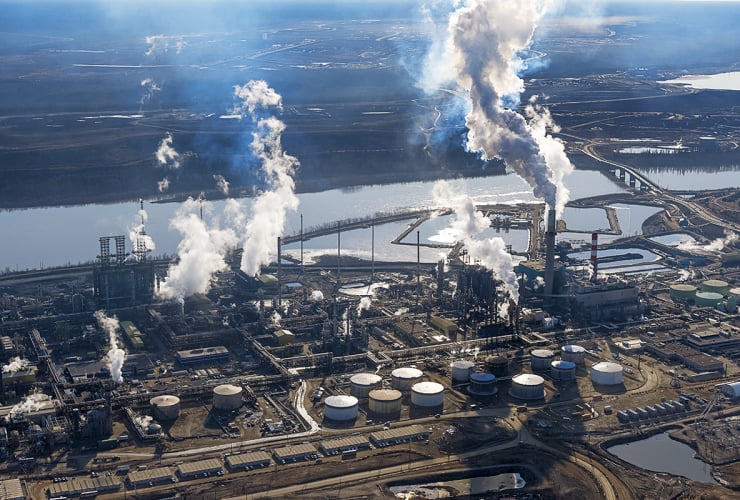As controversy swirls around the fate of the Kinder Morgan pipeline, a quieter storm is gathering about vehicle emissions.
A group of West Coast leaders, including those from B.C., California, Washington and Oregon, are not pleased with the United States’ Environmental Protection Agency’s plans to weaken environmental rules for tailpipe greenhouse gas emissions.
American EPA administrator Scott Pruitt, who was appointed by President Donald Trump, announced last week that greenhouse gas (GHG) emission standards for cars and light trucks made in 2022-2025 would be rolled back.
The west coast leaders are not impressed.
“These standards have cleared the haze and smog from our cities and reversed decades of chronic air pollution problems, while putting more money in consumers’ pockets,” the governors of California, Oregon, and Washington, and the mayors of Los Angeles, Oakland, San Francisco, Portland and Seattle said in a statement. “This move sets us back from years of advancements by the automotive industry put in motion by states that took the lead in setting emission standards.”
Former U.S. President Barack Obama put the stricter emission standards in place, but Pruitt says they’re too strict.
B.C. Environment Minister George Heyman couldn’t disagree more.
“There appears to be no real reason for Trump to do that – it’s an affordable technology, it benefits consumers and it helps address climate,” Heyman said in an interview. “Those standards were agreed to by automakers in 2012, they’ve been preparing for this. … They have technology that is feasible at a very reasonable cost. It will reduce emissions, and it will lower the cost of fuel for consumers.”
California has the ability to impose stricter standards than those that are federally mandated, but because American and Canadian rules are aligned, if the U.S. federal requirements change, the standards would also automatically be lowered in Canada, unless a deliberate legal change is made.
Pruitt said he will re-examine California’s ability to override national standards, but California’s Attorney General Xavier Becerra said, if necessary, the state would file suit to protect its tougher standards.
“The Trump Administration’s assault on clean car standards risks our ability to protect our children’s health, tackle climate change, and save hardworking Americans money,” Becerra said in a statement. “California didn’t become the sixth-largest economy in the world by spectating.”
That’s some fairly tough talk and only time will tell how this conflict plays out. But Canada’s plan to reduce pollution and meet its Paris agreement commitment will depend on cutting vehicle emissions, so it doesn’t make a lot of sense to take a step backwards.
“I think across Canada – all provinces hopefully – certainly the Canadian government and the B.C. government – are working to develop robust climate action plans,” Heyman said.
Heyman said talks are ongoing between B.C., the federal government and the western states to keep the tougher standards in place.
“It just makes sense. They make sense from a climate perspective and they make sense for consumers,” Heyman said. “I think it’s in everyone’s interest that these standards are upheld.”
The governors and mayors of our neighbours to the south seem to agree.
“Our job as governors and mayors is to boost our region’s economic opportunities and to make our cities and states cleaner and healthier for our residents and businesses,” the Pacific Coast Collaborative members said in a statement. “This decision does the exact opposite, making America more dependent on oil while putting more lives at risk from pollution and shortchanging consumers at the pump.”
The Pacific Coast Collaborative, which includes Alaska, B.C., Washington, Oregon and California, represents a region of more than 55 million people with a combined GDP of $3 trillion, the group said in its statement.
“Automakers are smart enough to know this is the future and that when they make more fuel- efficient vehicles, they sell those to people,” Heyman said.
Heyman hasn’t spoken to federal Minister of Environment and Climate Change Catherine McKenna about the possibility of keeping the higher standards across Canada, but he said ministry staff are discussing it.
McKenna tweeted on April 4 that she had spoken to California Governor Jerry Brown about climate action and clean transportation.
“Looking forward to continuing to work together on cleaner cars, smarter fuel economy standards and pricing pollution,” she tweeted.
Had a great call today with @JerryBrownGov on #ClimateAction and clean transportation. Looking forward to continuing to work together on cleaner cars, smarter fuel economy standards and #PricingPollution. Did you know that California is the 6th largest #economy in the world?
— Catherine McKenna (@cathmckenna) April 4, 2018
The Ontario Ministry of the Environment referred questions to Environment and Climate Change Canada.
Samantha Bayard, spokesperson for Environment and Climate Change Canada, said in an emailed statement that the ministry is committed to achieving its 2030 greenhouse gas targets under the Paris Climate Change Agreement.
"The government continues to look for opportunities to reduce GHG emissions across the transportation sector and will consider Canada-specific requirements to maximize the benefits to Canada’s environment and economy," Bayard said in the statement. "We are paying close attention to the U.S. mid-term review of light-duty vehicle greenhouse gas emission standards. Any future decisions regarding regulatory changes in Canada will be informed by our mid-term evaluation, a process that the Department originally committed to in 2014 when the amended Regulations were published. Our mid-term evaluation will give careful consideration of environment impacts, as well as economic impacts to industry and consumers."
Heyman said a decision needs to be made as soon as possible.
“Automakers, I think, want to know exactly what’s expected of them,” Heyman said. “That’s why when these standards were agreed to initially, there were a number of years put in place to allow this to happen. They’ve been planning for it for six years now.”
The Associated Press reported that automakers applauded Pruitt’s announcement, but when Heyman was asked if automakers were pushing for a rollback, he said “absolutely not.”
“I was at the auto show in Vancouver a couple of weeks ago and automakers there impressed upon me how fuel efficient the vehicles are becoming – how even a vehicle 10 years old was nowhere near as fuel efficient as the ones of today,” Heyman said. “They are looking forward to making more progress on those as well as ramping up their sales and production of plug-in hybrids and battery electric vehicles.
“They know that this is part of the future and they’re trying to get ahead of it.”
At minimum, automakers deserve some certainty, so a decision must be made soon. Let’s hope it’s one that keeps its eyes on the road ahead, rather than in the rear view mirror.
Tracy Sherlock writes about B.C. politics for the National Observer. Send tips and story ideas to [email protected]
This story was updated to add a comment from Environment and Climate Change Canada.






Comments